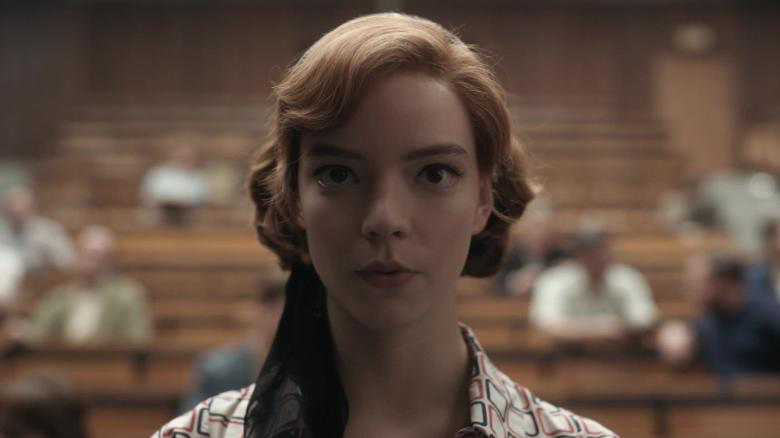Chess Gets Its Long Overdue Day in the Spotlight With Netflix’s “The Queen’s Gambit”

Image Courtesy of CNN
By Garrett Farrell
On paper, a show that deals with substance abuse, sexism, a chess prodigy, and Cold War politics may sound like it has a lot on its plate. However, when all of these topics are carefully made to service the development of a single character on her journey from a basement in rural Kentucky to halls of state in Moscow, they all coalesce magnificently into the story of Beth Harmon in The Queen’s Gambit.
The Queen’s Gambit was released by Netflix on October 23 to near instant acclaim, garnering a 100% on Rotten Tomatoes, and quickly became the platform’s hottest miniseries since last spring’s Tiger King. The series opens with Harmon entering the Methuen Orphanage after her mother was killed in a grizzly car accident; her father is out of the picture, and it is later revealed that he has no interest in parenting Beth. The show hints at Beth’s abilities almost from the first frame: viewers quickly find out that Beth’s mother received a doctorate from an Ivy League school for contributions to number theory, and the show quickly reveals that the apple didn’t fall far from the factor tree.
The plot thickens when Beth first catches a glimpse of a chessboard in the maintenance closet at the orphanage. From there, she begs the groundskeeper to teach her how to play, and immediately surpasses him. There are a few bumps in the road after this, but Beth develops the ability to play chess at an elite level in only a few years, which is remarkable considering how old she was when she first learned the rules.
The show focuses primarily on Beth and her quest to become the World Champion of chess, but Beth’s love life, her newfound national popularity, and her relationships with her friends and family add interesting wrinkles into an already superb plot. Perhaps the most intriguing relationship Beth has throughout the show is with the chief antagonist, the Russian World Champion Vasily Borgov. Although he and Beth only meet three times in the series, the two are constant foils of one another: Borgov’s age and mastery of the game are contrasted with Beth’s youth and imperfect play; his Soviet rigidity is contrasted with her American spontaneity. Although every aspect of the show from a technical point of view (teleplay, cinematography, directing, etc.) is nearly perfect, what truly makes the show phenomenal is the masterful performance of Beth, given by Anya Taylor-Joy.
Taylor-Joy’s performance is nothing short of incredible. It is primarily due to her performance that Beth is as sympathetic as she is; granted the script does give Harmon a tragic backstory that viewers can pity, this only goes so far, as the true extent of her childhood trauma is not revealed until near the end of the series. Beth is naturally a gritty character, and if it were anyone other than Taylor-Joy portraying her, it is exceedingly likely that the show would not have achieved its current popularity.
The Queen’s Gambit has several major themes, the most notable of which is substance abuse. At a young age, Beth is prescribed tranquilizers, which are outlawed several weeks after she begins taking them. However, Beth has already become dependent on them, and her addiction to the pills also leads to her becoming an alcoholic. Both of these addictions have massively negative impacts on her career. Early in her life, Beth is forbidden from playing chess because she suffered a massive overdose in Methuen, and later in life Beth must attempt a chess match against Borgov, who aside from Beth is the finest player in the series, while severely hungover.
Ultimately, The Queen’s Gambit is one of Netflix’s finest mini-series. It is built on a strong teleplay, gorgeous cinematography, and outstanding performances from everyone in the cast, especially Anya Taylor-Joy, who ought to be a serious contender for the 2021 Emmy for Outstanding Actress in a Leading Role, Limited Series, or TV Movie. The show is so popular that many fans have been asking for a second series of the show; however, they may not get their wish, as the Walter Trevis novel on which the show is based has no sequel.








